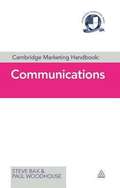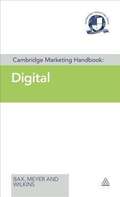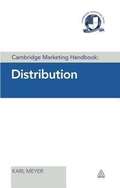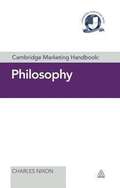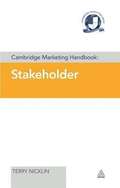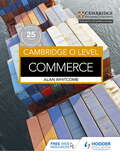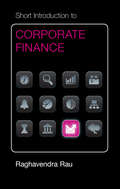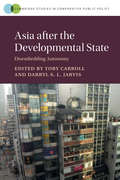- Table View
- List View
Cambridge International Trade and Economic Law: Developing Countries and Preferential Services Trade
by Charlotte Sieber-GasserWTO law sets the global minimum standards for trade regulation, while allowing some regulatory flexibility for developing countries. The exact scope of regulatory flexibility is often unclear and, at times, flexibility may be counterproductive to sustainable economic growth in developing countries. Undisputedly, developing countries would have some flexibility with respect to tailoring preferential services trade agreements to their individual economic needs and circumstances, but empirical data from over 280 preferential services trade agreements worldwide shows that this flexibility is rarely used. This volume clarifies the regulatory scope of flexibility for preferential services trade agreements between developing countries by linking the legal interpretation of WTO law with evidence from research in economics and political sciences. The book suggests that the current regulatory framework leaves room for meaningful flexibility for developing countries, and encourages policymakers and scholars to take these flexibilities into consideration in their design and study of trade policies.
Cambridge International Trade and Economic Law: Establishing Judicial Authority in International Economic Law
by Joanna Jemielniak Jemielniak, Joanna and Nielsen, Laura and Olsen, Henrik Palmer Laura Nielsen Henrik Palmer OlsenA central development in international law is the intensified juridification of international relations by a growing number of international courts. With this in mind, this book discusses how international judicial authority is established and managed in key fields of international economic law: trade law, investor-state arbitration and international commercial arbitration. Adopting a unique legal-centric approach, the analysis explores the interplay between these areas of economic dispute resolution, tracing their parallel developments and identifying the ways they influence each other on processual mechanisms and solutions. Drawing together contributions from many leading scholars across the world, this volume considers issues such as the usage of precedent and the role of legitimacy, suggesting that the consolidation of judicial authority is a universal trend which impacts on state behaviour.
Cambridge International Trade and Economic Law: Export Restrictions on Critical Minerals and Metals
by Ilaria EspaConventional wisdom on the insufficiency of existing WTO disciplines on export restrictions has triggered momentum on the issue. In this book, Ilaria Espa offers a comprehensive analysis of the scope and coverage of WTO disciplines on export restrictions in light of emerging case law. She investigates whether such rules still provide a sufficient, credible and effective framework capable of preventing abuses in the use of export restrictive measures on critical minerals and metals during a period of economic crisis and change in international trade patterns. Giving a broad overview of the export restrictions applied to these materials, Espa identifies distinctive features in the proliferation of export barriers and analyses the existing WTO rules to reveal their scope, gaps and inconsistencies. She goes on to present solutions based upon her findings with the aim of bringing more coherence and equity to WTO rules on the export side.
Cambridge International Trade and Economic Law: Optimal Regulation and the Law of International Trade
by Boris RigodAre the limitations imposed on World Trade Organization (WTO) members' right to regulate efficient? This is a question that is only scarcely, if ever, analysed in existing literature. Boris Rigod aims to provide an answer to this fundamental concern. Using the tools of economic analysis and in particular the concept of economic efficiency as a benchmark, the author states that domestic regulatory measures should only be subject to scrutiny by WTO bodies when they cause negative international externalities through terms of trade manipulations. He then suggests that WTO law, applied by the WTO judiciary can prevent WTO members from attaining optimal levels of regulation. By applying a law and economics methodology, Rigod provides an innovative solution to the problem of how to reconcile members' regulatory autonomy and WTO rules as well as offering a novel analytical framework for assessing domestic regulations in the light of WTO law.
Cambridge International Trade and Economic Law: Reclaiming Development in the World Trading System
by Lee Yong-ShikProviding extensive coverage of international trade law from an economic development perspective, this second edition of Reclaiming Development in the World Trading System offers discussion of key principles of international trade law, trade measures, trade and development issues, and regulatory reform. Including such topics as the most-favored-nation principle, national treatment, and tariff binding, Lee also offers insightful analysis into new areas pertaining to agriculture and textile, trade-related investment, intellectual property rights, and trade in services. Looking at trade and development issues in Asia, Africa, and Latin America, as well as microtrade, an innovative international trade system designed to relieve the absolute poverty of least-developed countries, this book is essential reading that gives context to development interests and advances specific regulatory and institutional reform proposals. Lee lends insight into these topics with case analysis exemplifying how our trading systems have been adopted by the developing world in order to foster their own economic development.
Cambridge International Trade and Economic Law: WTO Dispute Settlement and the TRIPS Agreement
by Matthew KennedyThe TRIPS Agreement was implemented in the WTO to gain access to a functioning dispute settlement mechanism that could authorize trade sanctions. Yet TRIPS and the WTO Dispute Settlement Understanding are based on systems that developed independently in WIPO and GATT. In this book, Matthew Kennedy exposes the challenges created by the integration and independence of TRIPS within the WTO by examining how this trade organization comes to grips with intellectual property disputes. He contrasts the way intellectual property disputes between governments have been handled before and after the establishment of the WTO. Based on practical experience, this book provides a comprehensive review of the issues that arise under the DSU, TRIPS, GATT 1994 and other WTO agreements in intellectual property matters. These range from procedural pitfalls to substantive treaty interpretation and conflicts as well as remedies, including cross-retaliation.
Cambridge Marketing Handbook: Communications
by Paul Woodhouse Steve BaxCambridge Marketing Handbook: Marketing Communications looks at the contemporary integrated communications mix, in the light of the changes in digital marketing and aims to give an overview of the current tools that marketers need to have under their belts. Coverage includes: the purpose and uses of communications; the promotional mix; advertising tools; public relations and media tools; the meaning of consumer behaviour; communications plans and evaluation methods. The Handbook also examines the buyer behaviour theories for B2C and B2C, looking at the elements that make up the process of purchase.
Cambridge Marketing Handbook: Digital
by Karl Meyer Terry Nicklin Neil Wilkins Robert HardyIn today's electronic age no organisation can afford to ignore digital marketing. Understanding what tools are available, how to use them and how to create and implement a co-ordinated digital campaign are essential elements for every marketer's toolbox. And Digital Marketing means more than just establishing a website. There is a complex array of channels and tools including search engine optimisation, mobile and viral marketing, blogs, social media, affiliate schemes, apps, online advertising and web analytics which together have the capability of helping a business achieve previously unseen growth. Cambridge Marketing Handbook: Digital Marketing introduces the key concepts and tools, sets out to how use them effectively and how to create and implement a digital campaign. It also includes a wealth of recommended resources to enable every marketer to keep up to date with the latest developments in this fast moving arena.
Cambridge Marketing Handbook: Distribution
by Karl MeyerDistribution within an organization relates to processes, people and interrelations between other organizations which connect the production of the products and services to their end-users. It is a chain of elements that, when connected, provides a smooth flow of orders and fulfilment across the business. It can be long and distributed or short and concise and, like any chain, it is only as strong as its weakest link. This handbook from the Cambridge Marketing College series analyses and assesses the different distribution models and identifies the key issues related to determining distribution strategy across an organisation. It provides a concise guide to identifying the key distribution activities within a wide variety of national, international, physical and online businesses and how to relate the experiences of other businesses within a company.
Cambridge Marketing Handbook: Law
by Kiran KapurMarketers should be aware that there is a large amount of regulation and legislation and that ignorance of the law is not an excuse. However, many marketers feel very unsure how the various rules and regulations affect them. This handbook examines the key issues that affect marketers in marketing communications, including both traditional media such as advertisements and social media. Written by a marketer, rather than a lawyer, this handbook is designed to give practical guidance on all the necessary aspects. Legal language is very precise, and hence complicated; this handbook uses colloquial language for clarity. Each chapter includes clear summaries, examples and flow diagrams to help marketers understand how to comply.
Cambridge Marketing Handbook: Philosophy
by Charles NixonThis handbook sets the scene for marketers while asking some uncomfortable questions and raising some challenging issues. Do we need marketing at all and why do we get it wrong? Putting marketing in context with other functions for those who are new to the discipline, it begins to establish a Modus Operandi. For many, the operation of marketing comes with considerable military baggage, and this book offers some alternative frameworks. It finally considers the six spheres of marketing understanding and sets out a Periodic Table of Elements for Marketing. Written part as a guide and part as philosophy, it challenges the reader to think for themselves. Issues covered include: the state of the marketing profession and how we got here; is there a need for marketing?; the spectrum of marketing; consumer views of marketing; alternative views; the six operational spheres of marketing.
Cambridge Marketing Handbook: Pricing Points
by Harry MacdivittPricing is an emotive and complex topic, demanding an understanding of a number of domains of business knowledge. In this accessible handbook we present practical information and tools to enable the reader to make important decisions knowledgably and confidently, and to explain these decisions to colleagues. The material has a strong Value theme throughout as every pricing decision should be taken within the context of customer value. Cambridge Marketing Handbook: Pricing Points explores essential knowledge and important theory on topics including value, economics, accounting and segmentation. It covers conventional and novel approaches to pricing (competition, cost, value-based and dynamic methods) with contemporary illustrations from B2B, B2C and B2B2C. Real company examples throughout the book are drawn from global consulting practice with major enterprises and state of knowledge content from international conferences.
Cambridge Marketing Handbook: Products
by Tony WilsonWritten in two parts, this handbook provides a reference for practitioners, and for those who wish to complete a professional qualification. The first part explores the nature of the product itself and how it should fit with the marketplace. It deals primarily with (a) how to craft a strong value-proposition, as seen by customers, and (b) how to compile the business case, as seen by the selling organization, including chapters on portfolio management and branding. The second part covers the timeline of a product, and shows how the concepts of the first part evolve as time goes by, examining what has to be done in practice, from idea-gathering, through product development and launch, to product maintenance and eventual withdrawal. Covering both B2B and B2C contexts, the book examines the different emphasis that is needed for the different categories of product in each.
Cambridge Marketing Handbook: Research
by Steve BaxA straightforward guide to the key things that all marketers need to know about marketing research. This handbook takes the reader step by step through: the basic principles of market and marketing research; the key roles that research plays in marketing decision making; how to go about planning your research; the types of data and key steps to follow in gathering them; how to go about getting your research done - the all important briefing and proposal process; specifics on secondary and primary data methodologies; how to justify research in financial benefit terms; how to decide on what sampling approach to use and finally legal and ethical aspects that must be considered. The handbook recognizes the especial importance of online research in today's world and covers this in detail in a separate section.
Cambridge Marketing Handbook: Services
by Andrew HatcherThere are only two categories of purchases that people can make: products or services. Each, by its very nature, demands a different approach to marketing and sales. This situation is not new and indeed was highlighted in the early 1800s when French economist Jean-Baptiste Say argued that production and consumption were inseparable in services, coining the term "immaterial products" to describe them. This book takes a fresh look at the world of services marketing (the Servicescape) as we transition from the information age into what is being called the Age of Awareness - a period where individuals move away from information browsing and collection to the application of knowledge, emotion and responsibility to consumption, production and relationships. Revealing the impact of these changes on the marketing of services, it focuses on the role of people and processes in delivering success.
Cambridge Marketing Handbook: Stakeholder
by Terry NicklinMarketers have long held the view that the customer should be central to all they think about, all they do. Yet the developments of the last few years have shown that other forces are at play that can be at least as powerful and long lasting. A broader group of stakeholders exists whose needs and interests must be understood and satisfied in the quest for a strong corporate reputation and business success. Most recently the impact of the internet and social media has amplified the power of individuals to comment on, and ultimately to influence, the activities of organizations of all types. This handbook examines the identification of stakeholders: internal, connected and external, their ability to affect the organization, and how organizations should relate to them. It also examines the organization itself and the factors which influence the development of its corporate image among its various stakeholder audiences.
Cambridge National Level 1/2 Enterprise and Marketing
by Tess BayleyReinforce classroom learning and strengthen your students' understanding of the content with this student book written for the Cambridge National Level 1/2 in Enterprise and Marketing.Covering all three units, this essential student book will help to build students' knowledge and develop the skills required for success in Enterprise and Marketing.- This reliable and accessible textbook is structured to match the specification and provide your students with all the information they need, giving them the opportunity to build skills through appropriate activities.- Builds students' skillsets with clearly-focused content to aid progression and questions to assess understanding.- Prepares your students for both the internal and external assessment with opportunities to test and consolidate understanding.
Cambridge O Level Commerce
by Alan WhitcombProvide full coverage of the latest syllabus for examination from 2018 with a full-colour textbook written especially for the international student and endorsed by Cambridge AssessmentInternational Education.- Provide thorough preparation for students' examination with a range of questions and activities that engage students while checking their understanding of the key concepts- Consolidate learning with structured and multiple-choice questions at the end of every chapter- Cater for all students' needs with a course that provides extra language support
Cambridge Police Department (Images of America)
by David J. Degou Commissioner Robert HaasFormally organized in 1859 with the appointment of John C. Willey as the first chief of police, the Cambridge Police Department was then manned by only 16 officers. The department has grown dramatically from its humble beginnings and today employs 277 sworn officers and a civilian staff of 37. Cambridge Police Department, the first comprehensive photographic history of the department, contains over 100 years of historical photographs, including images of specialized traffic and K-9 units, auxiliary police officers, uniforms, and equipment. Many of the vintage photographs in the collection have come from the department archives or were donated by family members of Cambridge officers.
Cambridge Short Introductions: Short Introduction to Corporate Finance (Cambridge Short Introductions To Management Ser.)
by Raghavendra RauThe Short Introduction to Corporate Finance provides an accessibly written guide to contemporary financial institutional practice. Rau deploys both his professional expertise and experience of teaching MBA and graduate-level courses to produce a lively discussion of the key concepts of finance, liberally illustrated with real-world examples. Built around six essential paradigms, he builds an integrated framework covering all the major ideas in finance over the past half-century. Ideal for students and practitioners alike, it will become core reading for anyone aspiring to become an effective manager.
Cambridge Social Ontology: An Introduction to Social Positioning Theory (Economics as Social Theory)
by Yannick Slade-CaffarelSocial ontology is the study of the nature and basic structure of social reality. It is a rapidly growing field at the intersection of philosophy and social science that has the potential to greatly assist social researchers of all kinds. One of the longest running projects in social ontology has developed over the better part of the last four decades through the work of Tony Lawson and the Cambridge Social Ontology Group. Cambridge social ontology has its origins in an assessment that the widespread explanatory failure of modern mainstream economics, as well as in the social sciences more generally, is due to sustained ontological neglect and the resulting use of research methods that are inappropriate, given the nature of social material. The Cambridge project’s aim has been to rectify this neglect through conducting explicit and sustained inquiry into the nature of social material with a view to elaborating an explanatorily powerful conception of social ontology. The result is social positioning theory. This book is an introduction to the key features of social positioning theory, provides context as to the theory’s development and illustrates how social positioning theory can clarify the natures of phenomena such as gender and the corporation.Cambridge Social Ontology is for social scientists, philosophers and all readers interested in gaining a better understanding of the nature of social phenomena.
Cambridge Software Corp.
by Anirudh DhebarCambridge Software Corp. must decide whether or not to offer multiple versions of a new software product. The firm has identified five market segments for the software and is deciding which, if any, of three product versions (a high end "industrial" version, a mid-range "commercial" version, and a low-end "student" version) to offer. The decision depends on the size of the different market segments, the customers' willingness-to-pay, and the costs of developing and producing each of the three versions.
Cambridge Studies in Comparative Politics: The Politics of Land Reform
by Michael AlbertusWhen and why do countries redistribute land to the landless? What political purposes does land reform serve, and what place does it have in today's world? A long-standing literature dating back to Aristotle and echoed in important recent works holds that redistribution should be both higher and more targeted at the poor under democracy. Yet comprehensive historical data to test this claim has been lacking. This book shows that land redistribution - the most consequential form of redistribution in the developing world - occurs more often under dictatorship than democracy. It offers a novel theory of land reform and develops a typology of land reform policies. Albertus leverages original data spanning the world and dating back to 1900 to extensively test the theory using statistical analysis and case studies of key countries such as Egypt, Peru, Venezuela, and Zimbabwe. These findings call for rethinking much of the common wisdom about redistribution and regimes.
Cambridge Studies in Comparative Public Policy: Disembedding Autonomy (Cambridge Studies in Comparative Public Policy)
by Toby Carroll Jarvis Darryl S. L.Asia after the Developmental State presents cutting-edge analyses of state-society transformation in Asia under globalisation. The volume incorporates a variety of political economy and public policy oriented positions, and collectively explores the uneven evolution of new public management and neoliberal agendas aimed at reordering state and society around market rationality. Taken together, the contributions explore the emergence of marketisation across Asia, including China, Japan, South Korea, Indonesia, Malaysia and Vietnam - what is now often described as the world's most economically dynamic region - and the degree to which marketisation has taken root, in what forms, and how this is impacting state, society and market relationships.
Cambridge Studies in Contentious Politics: Meaningful Resistance
by Erica SimmonsMeaningful Resistance explores the origins and dynamics of resistance to markets through an examination of two social movements that emerged to voice and channel opposition to market reforms. Protests against water privatization in Cochabamba, Bolivia, and rising corn prices in Mexico City, Mexico, offer a lens to analyze the mechanisms by which perceived, market-driven threats to material livelihood can prompt resistance. By exploring connections among marketization, local practices, and political protest, the book shows how the material and the ideational are inextricably linked in resistance to subsistence threats. When people perceive that markets have put subsistence at risk, material and symbolic worlds are both at stake; citizens take to the streets not only to defend their pocketbooks, but also their conceptions of community. The book advances contemporary scholarship by showing how attention to grievances in general, and subsistence resources in particular, can add explanatory leverage to analyses of contentious politics.

